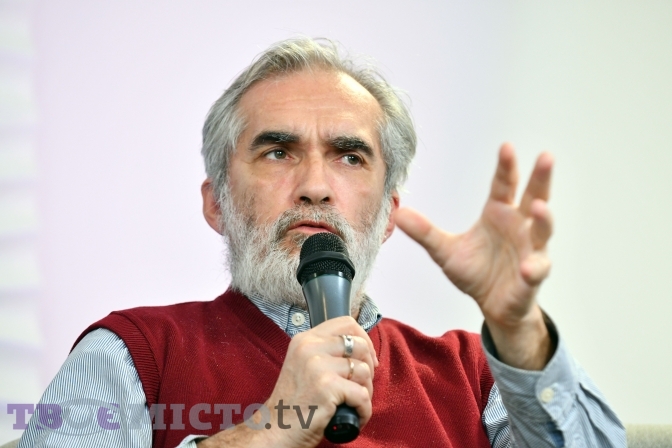
[For urgent updates please follow Ukrainian Freedom News on Telegram]
We cannot have Russia as our enemy for years, because it will cost too much. Our focus should be on the political reforms and disarmament of this mafia state. This is the opinion of Yaroslav Hrytsak, a historian and professor at the Ukrainian Catholic University. In the studio of the media hub Tvoe Misto/ Lviv Now, he spoke about the Russian pendulum, the tragedy of Russia, and when and why Ukraine became a threat to Russia.
You recently wrote a very relevant article, «Russia’s problems Go Far Beyond Putin.» How far does this problem go, if it’s not just about Putin?
There has been such a presumption that Putin came to power manipulating the public opinion of Russia, therefore Russians should not be blamed, because it’s Putin. And this is partly true. However, we saw the clear tendency that Russians, most Russians, wanted to trade their liberty for stability. They were in favour of censorship, the restoration of the «great power» status, a great military to show their supremacy. There has been excellent article written in 2004 by Richard Pipes, a Harvard professor of Russian history. And basically, the main point was that it’s not Putin who made Russia, it was Russia that welcomed him. And Putin began to use this trend. This is a very specific context dating back to the 1990s, but the historian says that this is a larger picture.
There is also the opinion that Russia is, in fact, a European country. But there is a problem, because every time the Russian elite tries to liberate the country, put it on the Western path of development, it is followed by a tendency to more intense repression. It’s like a pendulum swinging back and forth. Since the collapse of the Russian Empire in 1917, we had 9 months of liberal reforms, and then 40 years of Stalin and Lenin. Then we had Khrushchev, and after him – 20 years of Brezhnev. Later were about 10 years of Gorbachev and Yeltsin, and now, we have 22 years of Putin. The problem is how to stop the Russian pendulum. Because the real trauma and tragedy of Russian history is that every time the Russian elites seeks to emancipate society, it does not accept this kind of project. The problem is that they want a «strong hand». And this idea is constantly being discussed: what should be done to stop this pendulum.
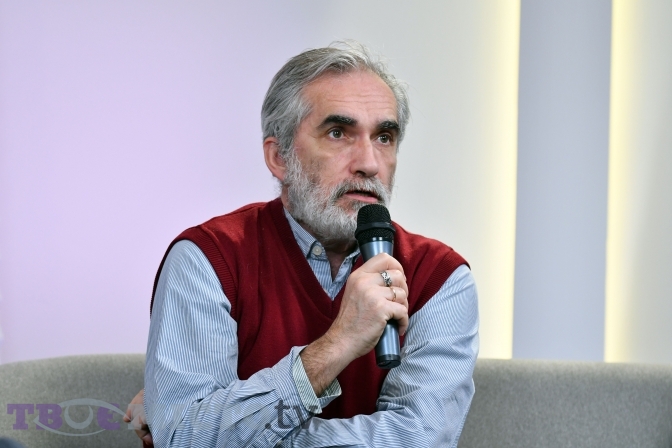
In your article, you quoted the classical authors of Russian literature, who constantly appeal to the Russian culture. These authors are widely cited by Western intellectuals as those who are representing this great culture and may offer an alternative to Putin’s narrative. But for Ukrainians, these names are controversial: Dostoevskyi, Bulgakov, Nabokov and others. Is it possible now to rethink this heritage, as well as postcolonial studies, or should Ukraine invent something else?
I am not an expert in the literature and have some questions to postcolonial studies that should not be discussed. I basically work more with «hard facts» rather than with interpretations. And the «hard facts» have a whole bunch of famous Russian cultural figures who at one time or other said perhaps the most disputable things about other nations, particularly about Ukrainians, Poles, Jews and others.
Among them are Nobel prize winners like Solzhenitsyn or, more specifically, Brodsky. Brodsky, before his death, wrote an extremely hateful «roars» on the Ukrainian independence. And it’s hard to read even for Russians because there’s so intense hatred toward Ukrainians. He basically believed that what the Ukrainians had done was a big mistake because sooner or later, they would go back to Russia, since they were not a nation, not viable. You could trace this to Dostoevsky, Pushkin. A lot of articles and monographs have been written on this type of Dostoevsky’s xenophobia. But this is not a problem. You can hardly classify Dostoevsky as a liberal, he was not, he was a monarchist. The real problem is that even if you are dealing with Russian liberals, you still have problems.
Every liberalism has its limitations and its stepstones where it gets stuck. For European liberalism, the Jewish issue was one of the most problematic. They haven’t been able to find a solution to the Jewish question, and therefore, are often anti-Semitic. When we talk about Russian liberalism, it is very often anti-Ukrainian. The stumbling block for Russians is the Ukrainian question. There is even a phrase: Russian liberalism ends where the Ukrainian question starts. And this narrows the field for future reconciliation between Ukrainians and Russians to very limited possibility and space.
There are wonderful intellectuals, I can name them – Alexander Herzen, Chernyshevsky, Andrei Sakharov. In this sense, they are truly open to reconciliation. The problem is that there are very few of them, and they are not heard. Or like nowadays – Dmitry Bykov, Yulia Latinina, Nevzorov. The important thing is that most of them are Russians of Jewish origin because it creates a certain liberal tradition that distinguishes them. But most of them are either in exile or in prison. And their voices now are practically not heard.
Does this mean that you do not see any future for them in Russia?
Everyone has a future. It should not deal with issues of culture or anything on an individual level. There must be some structural changes, such as institutional changes. Because I believe that the Russian problem cannot be delt by these methods alone, if only to appeal to culture. Their problem is much deeper, historical, and such can be solved only through structural reforms. And I would say that the main reform is political modernization, which will limit the central power. They could not really solve the problem, and therefore could not limit the central power. In this sense, in my opinion, Ukraine is doing much better. Of course, not always successfully, but much better, because there is a constant change of government, every four years, and it is unknown who will be the next president. There is a real political struggle, very often, without a doubt, effective. Of course, there is corruption, but there is still a movement, and Ukraine is moving in that direction. And if the war does not stop this problem, we can hope that it will be resolved later.
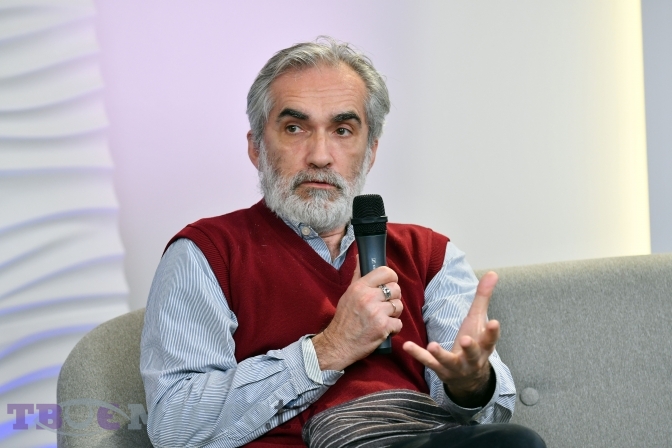
Read also: «The Rubicon was crossed.» Vakarchuk about the formation of new Ukraine and the final battle
We had many issues like that in the 19th century, the Polish, German, and Jewish questions that were unresolved. They were mostly resolved in the 20th century, mostly as a result of very bloody events. But in my imagination, the two main issues are still unresolved today: the Ukrainian and the Russian question. I think Ukraine is much closer to the the solution because we have the right political construction. This is still a big challenge for Russia because it needs structural changes. And it’s important that no nation can solve these issues on their own. We need someone to help from the outside. It’s like Germany after the war, or even post-war Europe. Europe was very authoritarian in the 1920s and 1930s. In Italy, even in France, there was this authoritarian direction, so there must be change from below as well as from outside, and then the problem can be solved. That is why I say that once Russia is defeated – which I very much hope for – structural rules must be imposed on it from the outside as well, some pressure must be done, so that these political reforms work. Because I do not believe that Russian society itself is now able to embody such changes.
In your opinion, Russia must be defeated in the militarily terms, and there must be cooperation between Russian society, which must change and become in opposition, and external forces. Could you explain how you see this process?
As a historian, I would say that mafia-type state are a norm, violence is the norm, democracy is the exception. Mafia-type states have synonymical poverty – South Italy, North Korea. Because, in fact, it is a global system that has existed throughout history. There is power, elites who collect tribute from below and divide it among themselves. And the share of the tribute you receive depends on your place in the hierarchy. And it all depends on personal connections. This is the mafia, there is a Godfather. And this creates a lack of trust in all institutions, a lack of solidarity, society is atomized. Gulags, North Korea – you know these examples, and this is the norm. And this norm has disappeared in a certain part of the world, which is mostly Western Europe, and basically for the last two centuries. This new norm is extending and becoming global, because I am looking in this direction, at the Arab revolutions, the Occupy, Armenia, and recently Belarus. I want to say that this is a global trend. If you look at it historically, it lasts for decades, centuries, because you have to work very deeply. I don’t know where to start – from culture, social relations, but at least you need to start somewhere to set the direction. And the main direction is to limit the central power, this is the main task. It should be divided into two or three parts: there should be an independent court, independent decision-making… It is impossible to get the rule of law at once because it is a historical problem. Therefore, I can be optimistic about Russia in the long run, but not in the short run.
We can’t have this enemy for years, it will cost us too much. I would like to say that our attention should be on the political reforms, and disarmament of this mafia state. We can say that there is not big difference between Putin’s mafia state and the Inca empire or the Egyptian empire – this is the same type, it just needs to be disarmed. There is a lot of research and experience on how this can be done. But the first thing you need is a sufficient number of people who would support it.
The main issue remains dignity as a value and freedom as a value. This is also a problem in Ukraine, and it takes decades or longer record to get the country moving in the direction of these values. I believe that Ukraine deserves the Marshall Plan, kind of Marshal plan, because without the Marshall Plan we would hardly have today’s Europe.
Just to clarify. You say that changes in Ukraine will take decades...
Generations, always say generations.
Yes, generations. However, if you look at post-war Germany, which carried out denazification for several decades...
About 20 years.
So can we say that this can be a role model for the Russian society?
Without doubts. I still believe that there is a European gene in Russian culture. I can’t give it a definition, but it definitely is. We need to work with him. I believe that Russia is not a hopeless country, most countries have followed this path, the problem is that Russia is the last of them to follow it. Even if you look at Poland in the 18th and 19th centuries, it was hopeless at that time, or Hungary state, which had the same problems. Therefore, it is wise to be a historian in this case, because it gives a narrow space for optimism. Nothing can be exceptional, not even Russia. I believe that we should come here not with tactical, but with strategic solution, because in history we need to act so as not to get another putin after a while.
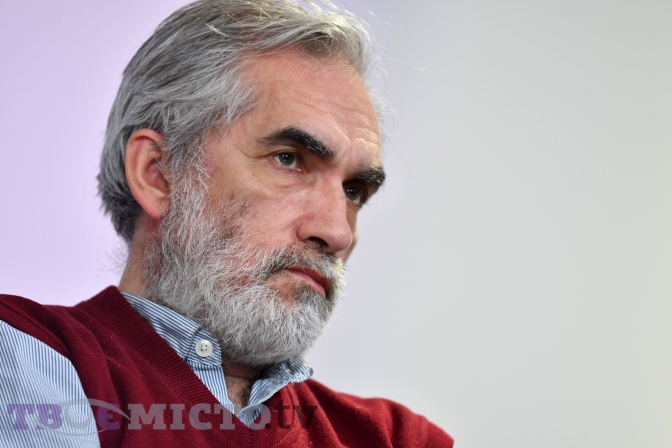
Your colleague from UCU, Vice-Rector Myroslav Marynovych, a former prisoner of the Soviet camps, was in our studio a few days ago and called it «the humanization of Russia.»
Call it as you wish. This, however, remains a strategic issue that the West often ignores.
Whose problem is this?
Russia is a global problem. This problem is for the whole world, including for Russians. And this is a problem, unfortunately, for Ukraine. Because everyone tolerated this problem in the West, and it became global. It’s like warming, climate change. No nation could resolve this problem on its own. Funding efforts are needed, but they must be strategic. Not only superficial, tactical, but strategic.
When did Ukraine become a threat to Russia?
This is a complicated question, thank you for it. But very generally, this is the second half of the 19th century. Before that, very few Ukrainians and Russians considered each other enemies. Until the middle of the 19th century, Ukrainians would see Tatars, Turks and Poles as enemies. The change occurred in the second half of the 19th century due to the repressive policies of the Russian Empire, foremost, the ban on the Ukrainian language, twice. At that time, the Russian Empire started to realize the danger of the Ukrainian question. And then the culmination was the First World War and the revolution of 1917. This was probably the main beginning, because military aggression began. Before that, there was verbal aggression, the efforts of the state since the second half of the 19th century. But the real problems began in 1914-1917. One hundred years of this Russian-Ukrainian undeclared war.
Do they consider it only a geographical threat to their empire?
Geographical – without a doubt. This is an important issue, because Ukraine is the largest non-Russian territory near the Russian Empire with rich resources. Therefore, this is a quite typical colonial imperial relations. But what was not typical is that Ukrainian territory has a deep symbolic meaning for Russia. They consider this is the cradle of their civilization. In fact, it is, but they think it’s just their cradle. They impose a certain right of ownership on it. Therefore, they cannot even imagine that Ukraine and Russia exist separately, because they believe that this is their territory. Therefore, it is difficult to find analogues on a symbolic level. Britain and Scotland – probably yes and no. Britain and Wales – it is hard to say. The problem here is that Russia is a very atypical country. Because in other cases, there is always a clear distinction between where there is a metropolis and where there is a colony, and they are mostly separated by sea or ocean. Nobody claimed that India could be the core or Algeria. But Russia claims that Ukraine is the core, or Baltic is the core. It’s the same geography, but mental.
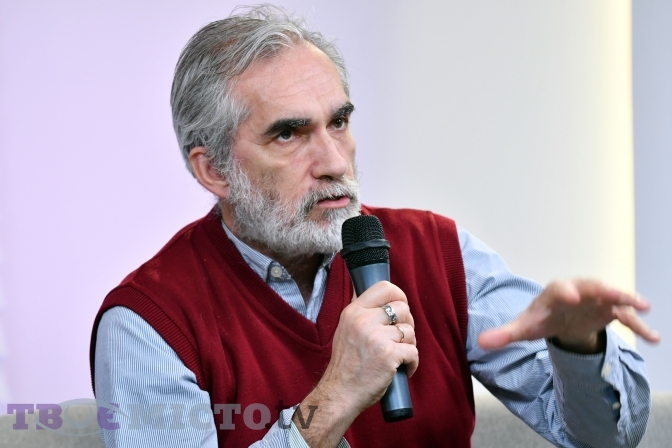
Is it like Israel and Palestine?
Yes, to some extent. However, Israel and Palestine differ in culture and religion, and in the case of Ukraine and Russia, there are Orthodox here and there, and the Russians consider it a common heritage.
Do Russians consider this an existential threat?
Undoubtedly, this is an existential war. That’s why it’s hard for me to believe that everything will be solved with the armistice. I apologize for the comparison, but it’s like a war between Rome and Carthage, when someone has to be excluded. In our case, the question is who will be Carthage – Moscow or Kyiv? I hope it will be Moscow. But this is a war that has been going on for decades, and we do not see an end to it. This is a war for existence. In this sense, it is very reminiscent of World War II – a war of destruction, than of the First World War.
I recently heard from a TV that Russia is Putin’s first victim. It reminded me a lot of Austria, which was called the first victim of Hitler. The problem is that Austria was very willingly succumbing to Hitler in 1938. Were it not for Austria, it would have been much harder for Hitler to attract to his side all other countries. It is said that Austria’s greatest success was that Mozart was an Austrian and Hitler a German. In this sense, I can say that Putin is a very much Russian. Undoubtedly, this is Putin’s personal war, he started it. If someone else was in power, he would also not be very friendly to Ukraine, there would be some struggle, but not military aggression. That is why this is Putin’s personal war. But in this case, the Russians not only permitted Putin this war. They were very much willing someone like Putin to come to power. Polls in the 1990s showed that Russians dreamed of someone who would come and restore, «make Russia great again,» and to «raise Russia from its knees,» the glorification of Stalin. It is very popular there. This is nonsense, but nonsense that works. So I would say that they are not deceived – they wanted to be deceived. This is the biggest problem.
That is, they are participants?
Yes, they are participants, they are responsible. And most Russians I know, honest Russians, keep asking me for forgiveness, I don’t blame them. But most Russians don’t even think about asking for forgiveness because they think they’re right. This is a weird situation, but they are responsible. This does not mean that they should be brought to the court, but there should be moral responsibility for the war. Like the Germans under Hitler, because they made it happen – they were willing to make it happen.
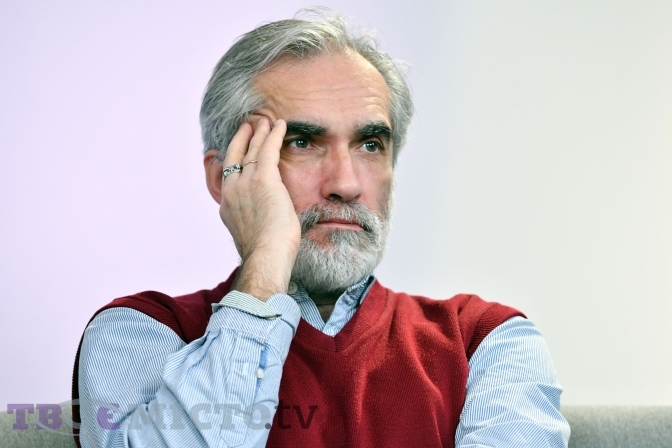
Do we have a chance to convict Russia?
The chances or possibilities to bring criminals to the court depend on the end of the war, its outcome. But an armistice will probably be impossible after all these atrocities, let’s be realistic. It is very likely that this will end in the collapse of Russia. But in any case, we see this as an agenda, we need to prepare all the documents and direct governments in this direction. And the important thing that has not been mentioned yet – we have atrocities on both sides, because it is inevitable during the war. Therefore, Ukraine must apply justice against all possible atrocities, it must be real justice. These are not very popular theses, but do you remember the recent publication of the editor of «Ukrainska Pravda»? She pointed this out, otherwise we will not be able to implement this idea of crime. The German example shows us that, in fact, only a few criminals were really prosecuted. Most of those who were responsible and worked for Hitler were left intact. Because the state must continue to function. It sounds cynical, but it is.
Konrad Adenauer [former Federal Chancellor of Germany] did not persecute enough Nazis, and this was attributed to him as hypocrisy. We have to wait for the generation that will change them. Only in the 60’s German society began to talk about it, seek consensus, ask uncomfortable questions to their parents. There is a lot of work here, because this is a Russian problem, and it is big. But everything will depend on the end of the war.
I would wish it to end in the complete collapse of Russia, but I would very much not like us to pay the price for it, because it will be very high. I would go for an armistice, because, as Zelenskyi said, for us Ukrainians, human life and dignity are paramount. Sooner or later, we must set these goals to punish those responsible for all the atrocities of this war. I listen a lot to the study of genocide, and initially the concept of genocide suggested by Lemkin was much broader.
The whole point was how to prevent genocide. The real problem was, when this concept was discussed at the UN, it was curtailed. I think we must now return to the original concept of genocide, to reformulate it. Otherwise, it will be hard to prove that what happened in Bucha can be considered genocide. After all, the concept was very much curtailed. And this is a global problem, because the concept of genocide needs to be reformed to prevent it from happening again, as has happened in Rwanda and Yugoslavia. This is repeated because, like mafia and violence, genocide is repetitive. They happen more often than we think.
The conversation was moderated by Taras Yatsenko and Maria Tomak,
Translated by Kateryna Bortniak
Photo by Ivan Stanislavsky
Follow us on Facebook and Instagram. Lviv Now is an English-language website for Lviv, Ukraine’s «tech-friendly cultural hub.» It is produced by Tvoe Misto («Your City») media-hub, which also hosts regular problem-solving public forums to benefit the city and its people.












